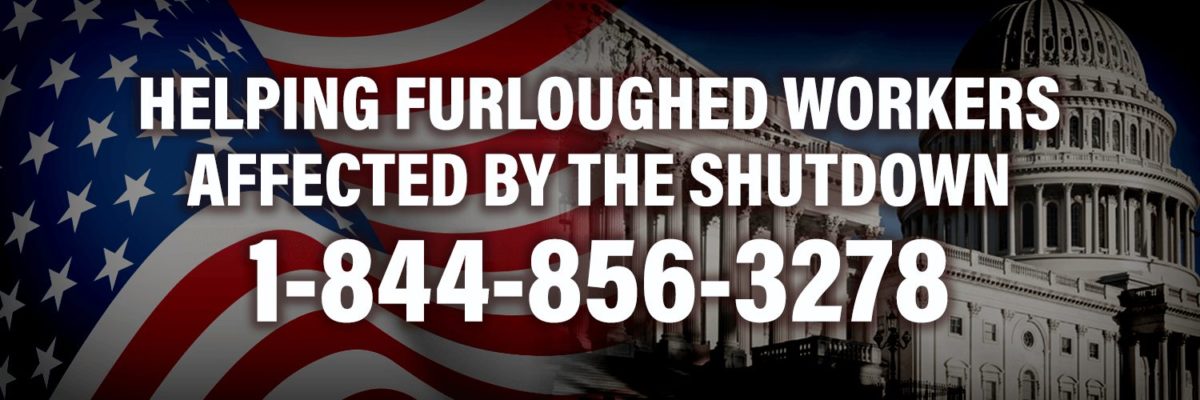
If you’re taking on credit card debt to cover expenses during your furlough, there are steps you can take to speed up your recovery.
As the government shutdown continues to drag on, more and more federal workers are turning to credit cards to get by. Unfortunately, going without pay for this long means many furloughed employees will have an uphill battle to eliminate the credit card debt they racked up during the government shutdown. With that in mind, Consolidated Credit has established a toll-free hotline to help workers cope with their financial stress. The company is also waiving fees on debt management programs for all federal employees affected by the shutdown.
Free assistance with credit card debt during government shutdown
“Financial stress can be all-consuming, especially when you’re living through a time of such uncertainty,” says Gary Herman, President of Consolidated Credit. “Many families are using their credit cards to cover missed paychecks. But then you have the burden of that debt weighing you down. During times like this, it can be helpful to talk to a certified professional that can help you find solutions or cost-savings that you may have missed.”
By calling the toll-free number, you’ll connect confidentially with a certified credit counselor. They can:
- answer general questions about your budget
- give advice on using credit during the shutdown
- offer tips on how to talk to your creditors and lenders about your situation
- help you create an action plan for a fast recovery once the shutdown ends
“We want to encourage federal employees to use this toll-free number to help minimize the financial stress caused by this extended shutdown,” Herman explains. “We’re here to help you get through this time with your finances intact, so you can recover as quickly as possible once the shutdown finally ends.
Key credit concerns during an extended government shutdown
Federal employees have a number of concerns that they need to be aware of when it comes to their credit. If you don’t have any income to get you through the furlough, missed payments can lead to:
- Credit score damage
- Fees and penalties
- Property repossession or foreclosure
However, the FDIC recently issued some advice that federal employees should talk to their lenders and creditors. You may be able to work out solutions, such as forbearance. This is where a credit card company or lender agrees to let you miss payments or send reduced payments temporarily during a period of financial hardship. Then, once the hardship is over, your regular payments start again.
“Don’t hide from your creditors during the shutdown,” Herman continues. “Talk to them and explain your situation. Most creditors should be willing to work with you. Forbearance can be crucial because it means that even though you aren’t making payments, you won’t face credit score damage or penalties.”
Finding credit card debt relief following a government shutdown
Once the shutdown ends, federal employees that relied on credit cards to cover expenses will need to find debt relief. Identifying the right solution will depend on several factors:
- How much debt you need to repay
- Your credit score
- Whether or not you will receive backpay
Your goal after the shutdown ends will be to pay off your balances as quickly as possible. To do that, you need to minimize or eliminate interest charges applied to the debt. If your balances are below $5,000 and you have good credit, consider a balance transfer. You can qualify for a credit card that offers a 0% APR introductory rate for 6-18 months, depending on your score. That gives you time to pay off your balance interest-free.
If you owe more than $5,000, then a balance transfer may not be an effective solution. It will be difficult to pay off the balance before the 0% APR period ends. In this case, if you have good credit and owe $25,000 or less, consider a debt consolidation loan.
If you don’t have good credit or you owe more than $25,000 total, then you will probably need professional help to get out of debt. You should contact a consumer credit counseling agency and see about setting up a debt management program.
With a DMP, you can pay off everything you owe quickly, even with bad credit
A debt management program will roll all of your credit card balances into a consolidated repayment plan with one monthly payment. The credit counseling team contacts each of your creditors and negotiates to reduce or eliminate interest charges and to stop any penalties. You avoid damaging your credit score by paying back everything you owe.
“At Consolidated Credit, we realize that with an extended shutdown like this one, federal employees can quickly run up huge balances that can be tough to repay with traditional payment methods,” Herman explains. “That’s why Consolidated Credit is waiving all setup and monthly administration fees on debt management programs for federal employees following the shutdown. It’s our way of helping them get their finances back on track quickly.”
Herman also encourages furloughed workers who receive back pay should use those funds to pay off their debt. You can give your creditors lump sum payments starting with the highest APR debts first. Or, if you have more debt than you can pay off with backpay, you can enroll in a debt management program and then make extra payments using the backpay.
“Our credit counseling team will help you set up a monthly payment that works for your regular monthly budget once you start receiving paychecks again,” Herman says. “But a debt management program allows you to make extra payments or larger payments when you have extra cash. So, once your program is set up, you can use backpay to take out a big chunk of what you owe. And we’ll help you make all those arrangements.”
